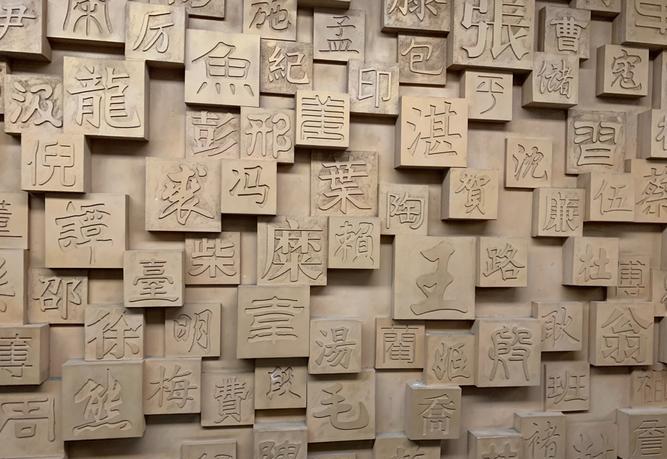Zhao Qiansun Li, Zhou Wu Zheng Wang, while still learning the language of the tooth and tooth, we recited the hundred family names under the leadership of our families, and listened to them tell the heroic deeds of our ancestors with the same surname. A surname is a symbol that marks a person's family kinship.

The earliest surnames originated from tribal chiefs and were used to distinguish the descendants of different clans to facilitate intermarriage, because it was still a matriarchal clan society at that time, so many surnames were next to female characters.
There are more than 5600 surnames recorded so far, but did you know? In fact, many of our surnames have evolved from these eight surnames. These eight surnames are also called the "Eight Great Surnames of the Ancients".
This first surname was the State surname "Ji" of the Zhou Dynasty. Those of us who have watched the TV series "List of Fengshen Gods" all know that the founding emperor of the Zhou Dynasty, King Wu of Zhou, was surnamed "Ji", but the Zhou royal family was not the first to use this surname.
The surname "Ji" is called the ancestor of the ten thousand surnames, because the earliest use of this surname is the Yellow Emperor Xuanyuan clan, Chinese called himself the descendants of Yan Huang, the Yellow Emperor is one of our Chinese ancestors. His tribe developed and prospered on the edge of the Ji River, so the tribe took "Ji" as the surname. The development and growth of male tribes such as the Yellow Emperor represents the disintegration of matrilineal clan society.
Due to the development and growth of the "Ji" surname, he has derived more and more subordinate surnames, such as we are familiar with: Zhou, Lu, Zheng, Wu and more than 500 surnames are evolved by the Ji surname.
The Yellow Emperor had twenty-five sons, and the Yellow Emperor gave his sons twelve surnames, one of which was given the surname "Jiaoji" by the Yellow Emperor, and this son established the ancient Yan Kingdom, so this surname gradually developed into another major surname in ancient times, derived from: Yan, Kong, Yin and other surnames.
The third surname, "Jiang", was first used by the Yandi Shennong clan, the Yellow Emperor was in Jishui, and the Yandi was in Jiangshui, so The yandi tribe took "Jiang" as the surname. There are also more than a hundred surnames that have evolved from the surname "Jiang", Qi, Lü, Xie and so on. The famous "Jiang" surname Jiang Ziya is the inherited Yandi tribal surname. Because Jiang Ziya's fiefdom is in Qi, the derivative surnames of the "Jiang" surname today are all derived from Jiang Ziya's fiefdom.
In the late Warring States period, the Jiang surname was mostly slaughtered, so few were inherited, and now the "Jiang" surname is a Sinicized evolution of the Manchu surname.
In addition to the Second Emperor of Yanhuang, there were several other leaders of the Ancient Tribes and the Second Emperor of Yanhuang were known as the "Three Emperors and Five Emperors". The fourth surname "Yao" is said to be one of the five emperors "Shun", Shun was born in Yao Xu, also known as Yao Chonghua, married two wives Emperor E and Lady Ying, Empress Dowager Ying was the daughter of a tribal leader at that time, Shun's talent was favored by this leader, he married his daughter to Shun, gave the concubine water to Shun as a territory, Shun took "Concubine" as his other surname, this surname is also the fifth surname in ancient times. The surnames derived from these two surnames are: Hu, Tian, Chen and so on.
The sixth surname "姒" comes from Dayu, Dayu's surname is said to be given by Yao, because Dayu has meritorious service in controlling water, so Yao gives the surname Dayu "姒", and now this surname has basically disappeared, and its derivative surnames are: Xia, Gu, Ouyang and so on. The famous beauty of the fallen country is based on this surname.
The last two surnames are related to one of the Five Emperors, Zhao Zhao, the grandson of The Great-grandson Bo Yizhi Shui, was given the surname "嬴" by Shun, and the descendants of the "嬴" surname made a living in Qindi, so it was mainly the surnames of the Qin state and the State of Zhao in the Spring and Autumn Period, because the qin emperor Qin Shi Huang unified China, so the "Yin" surname developed and grew, deriving the "Fourteen Surnames of the Ying", Zhao, Qin, Xu, etc. are his derivative surnames.
The last "妘" is the surname of Zhu Rong, the grandson of Zhu Rong, Zhu Rong is the sworn enemy of the water god Gonggong, this surname he took himself, and his surname is derived from the "Zhu Rong Eight Surnames", Cao, Lu, and Dong are all among them.
Later, people's surnames basically evolved from these eight surnames, of course, not including the surnames of ethnic minorities, so curious people can find the origin of their surnames. I won't go into an overview here.